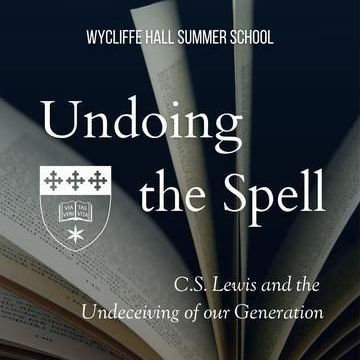In sum, the “father’s house” is more than a husband and a wife and 2-3 children (and perhaps a dog) and the stick figure family you might see on the back of an SUV. The father is not the male half of a couple who have fallen in love, got hitched and then decided to have kids once they’d got their forever home in the ‘burbs. It’s a family and small business combined and meant certain assurances. This is a system in which the father is the head of the household with unique social and legal responsibilities that includes more than just a nuclear family unit.
Your Questions: Why do we call God Father?
An exploration in the scope and limits of why we call God "our Father"
Recently there was a bit of a furore over something the Archbishop of York said about "Our Father" in the Lord's Prayer. I wasn't there. I don't know the context of what he was saying and I don't know to what extent news coverage and social media posts are click-bait, reactionary or reflective of genuine issues. Some have said he was just acknowledging that for some people "Our Father" are tough words to pray. Others have said the Archbishop was saying we need to get rid of language that calls God "Father". I don't know which it is, but it brings up a good question: why do we call God "Father"?
***
Calling God "Father" is something that is found throughout Christian faith and belief. Not only is it the opening words to the Lord’s Prayer, it’s in the Creeds (“I believe in God the Father”), in our worship songs (“How deep the Father’s love for us”), in liturgy (if we we’re from a liturgical tradition) not to mention frequently found throughout the New Testament. As Christians we believe in the Trinity and the chief term we use to describe one person of the Trinity is “Father.” Books are written and many a sermon preached on the “father heart of God.”
So, if it’s important, it’s probably also important for us to think about what we actually mean by it?! In addition, it would be wise to consider what we don’t mean when we describe God as this paternal figure: what are the limits of this metaphor? In general conversation (and on social media) over the years, I’ve heard people say God is “our Father” because he’s more a father than a mother. This approach defines a father in essence as a not-mother. Think of it this way: if father and mother roles are laid over each other like a venn diagram, why we call God father is because He is not the unique qualities of the mother that don’t overlap. Some try to explain this as innate or essential qualities of a father over a mother. Examples include that the father is the strong and rational parent where the mother is nurturing and tender. Or the father is the disciplinarian where the mother is the one who consoles. One I heard recently is that a father makes a choice to love their child in a way that comes naturally to the mother who has (usually) carried the child to term. But for all these stereotypes there are so many exceptions. The underlying issue is that they’re all based on experience, they’re highly subjective. This creates the inevitable problem that if my understanding of the role of a father is different from yours, we’re probably never going to agree on how to understand God as father! Not only is this a nightmare for consensus, but it’s also an example of eisegesis – reading into biblical texts ideas and concepts that aren’t native to it. And I’ve yet to find evidence that supports this sort of psychology-lite interpretation of why God is “our Father”.
A much better source of understanding for what it means seems to me to be what we actually find from the biblical world and biblical texts. Father, in a biblical context was the senior figure in the patriarchal family system (and please note I’m using patriarchal here to describe an ancient social system not a byword for the systematic oppression of women). In the Bible this set-up is often indicated by the description of “my father’s house” (e.g. Gen 12:1, 31:30, Judges 11:2, 1 Sam 22:15, 1 Macc 16:2 and 4 Macc 18:7). The key then is what was the role of the father within this system? Rather than try and fit modern ideas about family or parental roles onto ancient texts, it’s much better to try and understand the metaphors on their own terms. Once we’ve established what they mean in an ancient context, then we can think about what the implications are for today.
Let’s start by sketching out a little more of the biblical patriarchal social system. While it changed in how it looked over time from the time of the Patriarchs to the monarchic period and then after the exile, the fundamental ideas are still the same.[1] In the earlier times, the father was head of the household over his wife (and possibly wives), children, other brothers and unwed sisters, servants & slaves (male and female). The father was the one who owned the property and wielded power and authority.[2] He was the one to provide for those within the household—hence why the OT commands extra care and attention for the widow, orphan and foreigner. These were the folk that didn’t have the protection or provision of a patriarch, a dangerous reality the book of Ruth illustrates well.
By the time of the New Testament, the father was still head of the household but the size was scaled back significantly—as more mouths meant more expenditure. More than one wife wasn’t just a recipe for familial strife: it was expensive! Yet even though the households were smaller, the loyalty to the father is still assumed. There’s the disciple who wanted to go and “bury his father” first before following Jesus (Matt 8:21). His loyalty is to his kinship group and his father. James and John are working for their father Zebedee when they are called. In John 4:53 the father comes to believe which results in the whole household also believing. The responsibilities of levirate marriage are still present, whether or not it was regular practice (Mark 12:18-23). And consider the household of the father of the prodigal son: it consisted not only of the father and two brothers but also servants and slaves (Luke 15:19, 26).
So where does God as “Father” come in?
Interestingly, in the Old Testament, God is rarely described as Father. It happens just a handful of times (cf, Isaiah 63:16, 64:8, Deut 32:6, Psa 103:13, Prov 3:12) and is tied to God as the one through whom his people have life, have been redeemed and are shown compassion. But for the most part the description of God as father is absent in the Old Testament.[3] In contrast to the Old Testament, the New frequently uses the title “Father” for God. What’s interesting is where it particularly crops up:
(1) The Father as One who Provides
If you, then, who are evil, know how to give good gifts to your children,
how much more will your Father in heaven give good things to those who ask him! (Matt 7:11)
One of the most common contexts in which we find God described as Father is in connection with His role as one who provides for our needs. In Matthew 7 and Luke 11 there are the passages about God providing good gifts to His children. Likewise in James 1:13 God is the “Father of lights” and is the one from whom every good and perfect gift comes. In James, this characteristic of God as Father is set in contrast with exhortation elsewhere not to trust in other benefactors. It’s interesting to note that the famous “true religion” verse in James 1:27 (that to care for widows and orphans is true religion) is tied to religion before “God, the Father”. To care for the widow and orphan is to care for those who do not have the protection and safety of the patriarchal family unit, but because of “God, the Father” we offer exactly that because we are the adopted children of the ultimate spiritual Patriarch![4]
God as the Father who provides is also the found in the Lord’s Prayer: we address God as Father and then He is the one we ask to “give us our daily bread.” In the feeding miracle in John 6, the Father is the one who provides true bread (John 6:32). Elsewhere the Father also is the one who prepares for our future (John 14) and the one who provides consolation in our affliction (2 Cor 1:3). God as Father provides for the needs of his household both material and spiritual. Most significantly, God as Father has provided for our eternal safety – through the Cross of Jesus Christ and the death of His only Son.
(2) The Father as a Figure of Authority
In accompaniment with the Father as one who provides, in the NT God as Father is also shown as an authority figure and the one we are to trust by following His instruction and showing loyalty. Jesus is clear in Matthew 12:50 that if we are to be part of Jesus’ family, namely his mother, sister or brother, we are to do the will of the Father—it’s not about biology. In the passage about secret prayer and almsgiving in Matthew 6, it is the Father who sees our faithfulness and will reward. In Gethsemane in Luke 22:42, Jesus addresses the Father when in conflict about surrendering to God’s will. Indeed Jesus’ own authority as Son is derived from that of the Father (John 5:43) – a point of great indignation for the Jewish leaders (John 5:18).
Fathers as authority figures to whom obedience is due is well-reflected in John 8:41-44 in which Jesus has a discussion with some Jews. Jesus tells those he’s talking to that Abraham is not really their father because if he were they “would be doing as Abraham did” (v.39). Instead they are harboring violence against Jesus. The men respond by appealing that God is their father (v.40), but Jesus is clear if that was the case, they would love Jesus (v.42). Jesus’ conclusion is that their disobedience means that their father is really the devil (v.44): one who is a murderer and liar. Fathers are an authority figure who children honor through obedience and acting in line with their desires.
Call no one your father on earth, for you have one Father—the one in heaven. (Matt 23:9)
What is interesting about this authority is that in this passage it is not found in contrast to mothers but in contrast to other fathers. Elsewhere, in Mark 3:35, the parallel (and probable original) to Matthew 12:50, Jesus simply says we are to do the will of “God” to be part of Jesus’ family. No familial reference with respect to God himself. Yet the only roles there are to take within Jesus’ family are mother, sister and brother. Why? Because the role of father is already taken. We have only one authority figure: God himself. Matthew 23:9 puts it plainly: “call no one your father on earth, for you have one Father—the one in heaven.” It would be ridiculous for Matthew to mean that we aren’t to have biological fathers: the point here is about having loyalties that compete with God as our authority figure over all. Who do we trust for provision or safety instead of God? Where are our loyalties greater to a person or an institution than to God?
The inevitable issue with trusting in God over competing authorities is that it is costly. Our allegiance with our heavenly Father will lead to rejection and hostility. It will get us in trouble. It may even cost us our human families (Luke 12:52-53). Yet the assurance is clear: whoever makes such costly sacrifices of “brothers or sisters or mother or father or children or fields…” will receive “brothers and sisters, mothers and children” in the age to come (Mark 10:30). But notice “father” only appears in what we lose—we won’t gain new fathers in the age to come (like we will siblings or mothers) because in the spiritual, eschatological family, we only have God as our Father.
(3) The Father’s Ethic of Love
Lastly, the ethic of God’s household is what marks it out as distinctive and different. In John 8, the devil as father is murderous and hides the truth. But if God is your Father, the ethic is love. Love is the ethic of all parties God’s house. It is found between the Father and the Son (John 3:35, 5:20, 10:17, 14:31). And our obedience to God is to come from love and our love is shown through our obedience (cf. John 14, esp v. 21 & 23 and 15:9-16). The Father showed the nature of His love for us through the sacrifice of his Son (3:16) and our adoption as his children (1 John 3:1). The Son shows us his love through his willingness to die for us (John 13:1) and we are called to show this sacrificial love (15:12-13). The Father’s love is what we are to remain in and live from (15:9)—it is clear that love is something revealed by Godself and not a general unique quality. How do we know this? Because our allegiance to the Father’s love results in rejection (and not love) from the world (15:18-25). This love ethic is not general but rooted in the Father's revealed love and therefore our love in return is shown in loyalty to His.
See what love the Father has given us, that we should be called children of God; and that is what we are. (1 John 3:1)
In Conclusion
Why do we address God as Father? It is not because He is not maternal or exhibits stereotypically characteristics of motherhood (e.g. nurturing or tender). God is not our “Father” as opposed to mother. He is “our Father” because (in part) he is the chief of the clan. He is head honcho. To a first century audience to describe God as “mother” excludes the reality of God’s power and authority. God as “mother” leaves one to wonder whose household God resides in? Whose authority is He under—and how can God be God if He is under another authority? Or we might end up concerned for God’s safety(!)—if God as mother is a widow like Naomi and has no one to protect him. God is now vulnerable along with the orphan and the foreigner. Yes, these questions might seem a bit silly, but this is why context matters!
God as the “Patriarch” is also one who provides for us and keeps safe and the one into whose family we have been adopted as “sons” (and I use “son” as in this system the inheritance rights belonged to Jewish sons). Through the Cross we have been adopted into God’s family as children (not slaves) and we get to address this loving authority figure as our Father, Abba. We do so as “sons” – those who are entitled to inherit. But God is not male or more male than female. God is no more male as “our Father” than I am male as a “son” of God. Yet there is a pretty clear and consistent connection between God as Father and our obedience and willingness to follow His will. He is the one to whom everything belongs (indeed He made it…) and those in His house are to do His will and show Him our loyalty. Our kinship is now to be to God over and above all other ties–our relationships with our human fathers and non-paternal authority figures of any kind. This can be costly. It can also be healing.
Jesus invited his followers to call God “our Father” as a representation of what it means to come near to God and be in relationship with Him. For some of us that can take a minute to work out—many of us have been burned and hurt by authority figures in the past (male and female), so why would we trust God in this way? Well, this is the work of the Spirit through the Cross which begins with the tiniest bit of faith or willingness. It is possible to discover that “our Father” is not like authority figures of our past. What makes Him worthy and safe to trust as this authority figure—is that the chief characteristic and ethic of His household is love.
***
[1] For a look at how it functioned by the time of the NT, see Samuel Adams’ book Social and Economic Life in Second Temple Judea (WJK Books, 2014).
[2] E.g. When Abraham was circumcised it was not just him—or him and his son Ishmael—but Abraham and all the men in his household (Gen 17:23-27). Isaac’s house was becoming too prosperous, so King Abimelech sends him away (Gen 26).
[3] As a side note, it would be interesting to look at God as father in relationship to divine kingship ideology in the Old Testament, but that’s more than I’m able to cover in an already longer than planned blog post
[4] Romans 8 and Galatians 3-4.




